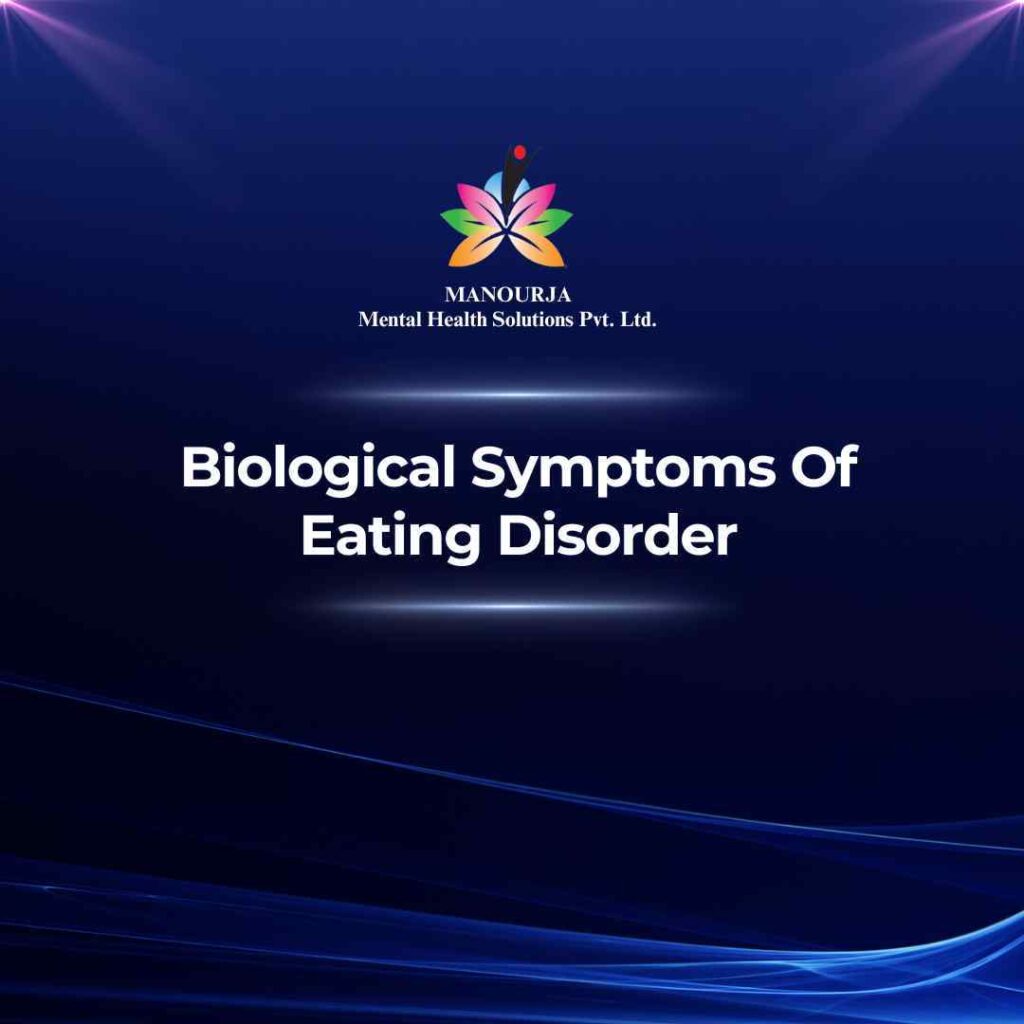Biological Symptoms of Eating Disorder

Eating disorders manifest through a variety of biological symptoms that reflect the physical consequences of abnormal eating behaviors. These symptoms can vary significantly depending on the type of eating disorder. Here’s an overview of the biological symptoms associated with common eating disorders such as anorexia nervosa, bulimia nervosa, and binge-eating disorder:
Biological Symptoms of Anorexia Nervosa
- Significant Weight Loss: Rapid or extreme weight loss due to severe calorie restriction.
- Amenorrhea: Loss of menstrual periods in women, which is a consequence of low body fat content.
- Osteoporosis: Decreased bone density leading to brittle bones, as a result of insufficient calcium intake and hormonal changes.
- Bradycardia: Abnormally slow heart rate, which can lead to heart failure.
- Hypotension: Low blood pressure, especially upon standing, leading to dizziness or fainting.
- Anemia: A deficiency in the number or quality of red blood cells, leading to fatigue and weakness.
- Lanugo: Growth of fine hair over the body, which is the body’s effort to insulate itself due to lack of body fat.
Biological Symptoms of Bulimia Nervosa
- Electrolyte Imbalances: Can occur from frequent vomiting, leading to irregular heartbeats, and potentially heart failure or death.
- Gastrointestinal Problems: Such as acid reflux, constipation, and irritation of the esophagus from frequent vomiting.
- Dental Issues: Erosion of tooth enamel from repeated exposure to stomach acid.
- Swollen Salivary Glands: Particularly the parotid glands, giving the face a puffy appearance.
- Hand Calluses or Scars: On the back of the hands due to induced vomiting (Russell’s sign).
Biological Symptoms of Binge-eating disorder
- Weight Fluctuations: Significant fluctuations in weight, with many suffering from overweight or obesity.
- High Blood Pressure: Often associated with higher body weight and poor diet.
- High Cholesterol Levels: Due to a diet high in fats and sugars.
- Type 2 Diabetes: Increased risk due to overweight, obesity, and poor diet.
- Gallbladder Disease: Higher risk due to obesity and rapid weight gain or loss.
Common to All Eating Disorders
- Nutritional Deficiencies: Depending on the nature of the eating disorder, individuals may suffer from deficiencies in essential nutrients such as iron, vitamin D, or vitamin B12, which can affect a wide range of bodily functions.
- Impaired Immune Function: Nutritional deficiencies and stress from eating disorders can weaken the immune system, making the body more susceptible to infections.
- Fatigue and Low Energy: Due to insufficient caloric intake or poor nutrition.
The biological symptoms of eating disorders can lead to serious and sometimes irreversible damage to the body. Effective treatment often requires a multidisciplinary approach, including medical care to address biological symptoms, nutritional counseling to restore healthy eating patterns, and psychological interventions to address underlying emotional and cognitive factors driving the disorder.
At MANOURJA, we believe in the transformative power of counseling. Our experienced therapists offer a safe and supportive space where you can explore your thoughts, emotions, and challenges. Through personalized counselling sessions, we’ll work together to develop coping strategies, build resilience, and achieve lasting positive change. Discover the path to a healthier, happier you with MANOURJA counselling services.
MANOURJA Rehabilitation Services
At MANOURJA, we’re dedicated to helping you in rebuild your life, after difficult times. Our rehabilitation services focus on understanding what you need to move forward, whether you’re recovering from addiction, trauma, or any psychological – social challenges. We create personalized plans, that are all about helping you, regain your strength and find hope again. With a caring team by your side, you’ll have the support to make real progress and take steps toward a brighter, healthier future.
